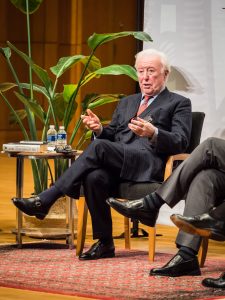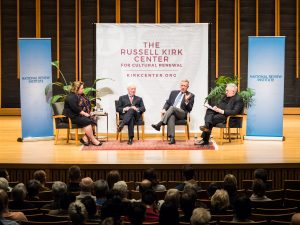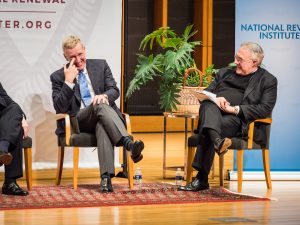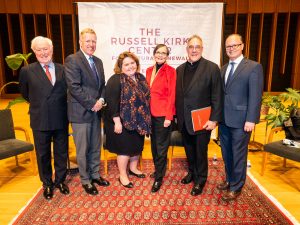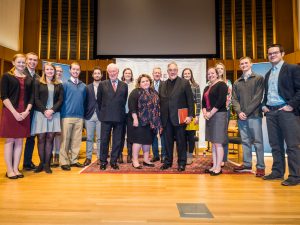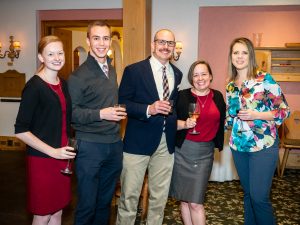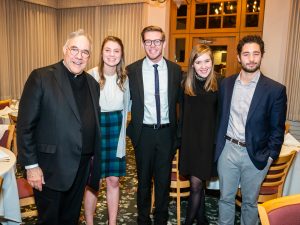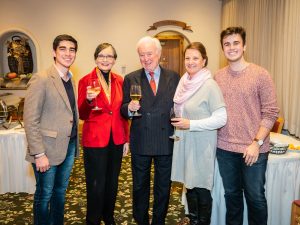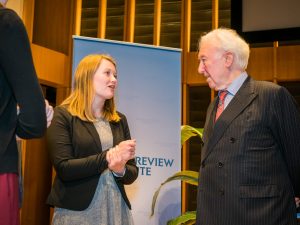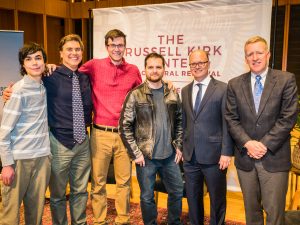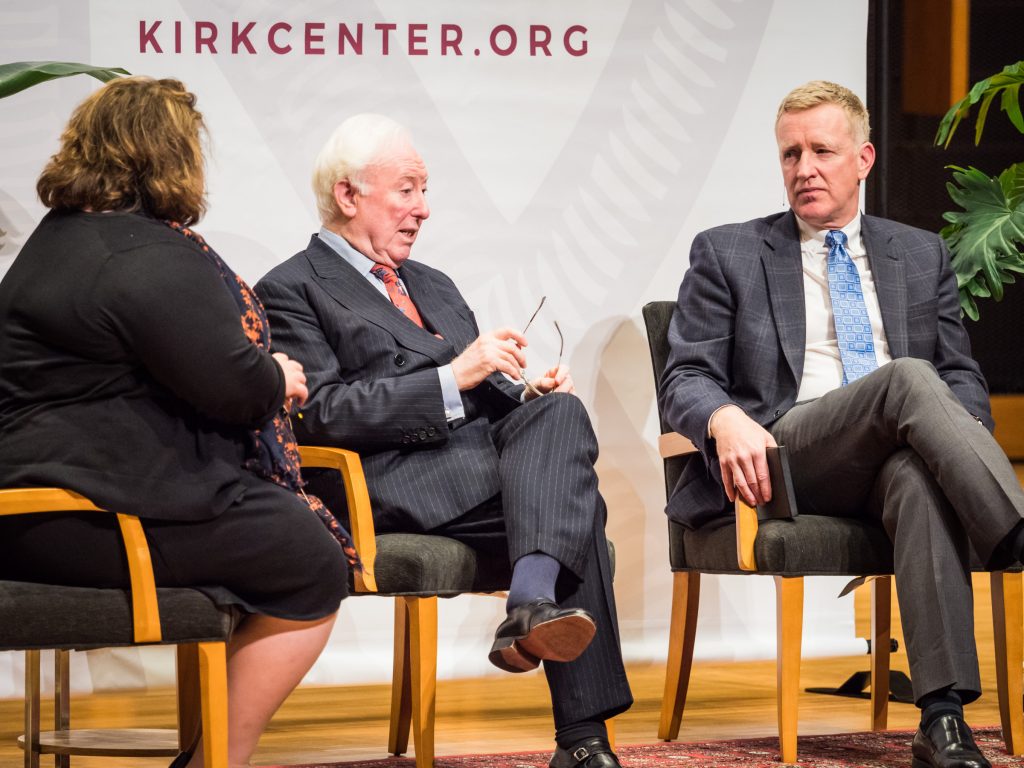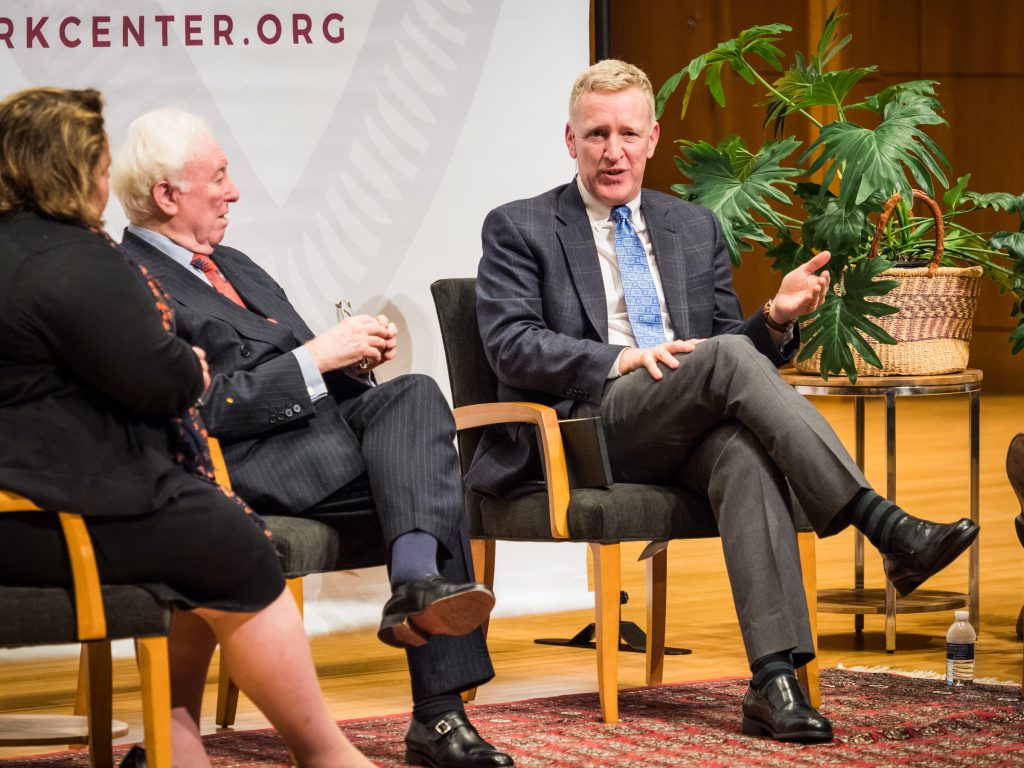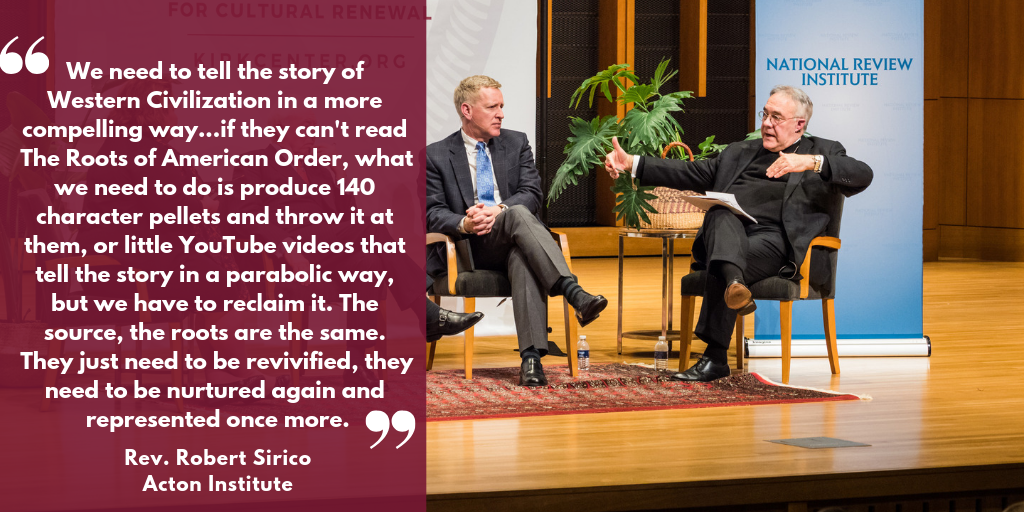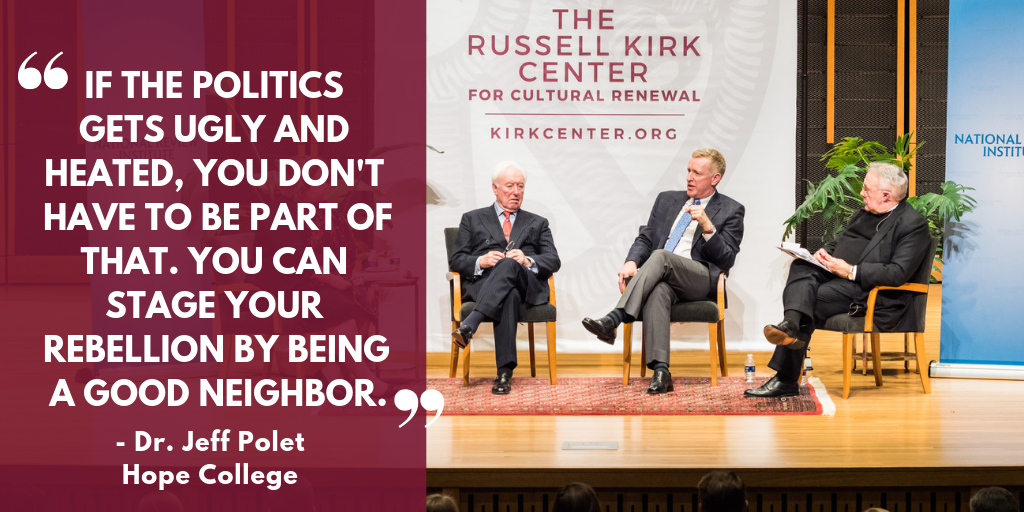
Watch: Russell Kirk and the Populist Moment
Kathryn Lopez, John O’Sullivan, Jeff Polet and Rev. Robert Sirico discuss Russell Kirk and the Populist Moment at Hope College
Kirk on Campus returned to Hope College on November 15, 2018 for an event commemorating the 100th anniversary of Russell Kirk’s birth and his continued influence. The event welcomed four serious conservative thinkers to the stage to consider our populist moment and how the life and writings of Russell Kirk can serve as guideposts for conservatives in this season of populist fervor.
What is populism?
As John O’Sullivan, editor at large of National Review, pointed out, populism is a difficult word to define:
“The word [populism] is used as the word fascism is used to mean ‘something I don’t like.’ And yet it covers so many different things at so many different times that it’s very hard to attach a really clear meaning to it.
“The way populism is used now in public intellectual debates, it is seen to be the antonym of liberalism. You have liberalism, liberal democracy and you have populism attacking it. Well, how true is that?
[…]
“As Pierre Manent the French writer says, what politics is now developing into is a contestation between, as he says, populist demagogy versus the fanaticism of the center. And he regards the fanaticism of the center in the defense of those policies it has passed without democratic consent as the more dangerous of the two. Now you can argue about that, but certainly it’s not simply a question of a lot of primitive people who don’t know about anything sort of clamoring to drag down from their seats of power the elites for no good reason. People feel that they’ve been badly governed, and they want to do something about it. And that’s a democratic response rather than a purely populist one.”
Rev. Robert Sirico, President of the Acton Institute, pointed out that political populists can arise from either end of the ideological spectrum, but that their telos runs no deeper than consolidating and protecting political power:
“Let’s remember that populism strides both ideologies…the commonality between them, and I think all populists, is that first and foremost–to genuflect to Russell Kirk who was genuflecting to T.S. Eliot–is that they are enemies of the permanent things. So it is an ideology governed by passions, governed by feelings, governed by desires. Not subordinated to a telos, to a truth. And that becomes very dangerous…the thing that ends up happening is what they want to do in the political realm is accrue more power. And that leaves, oddly enough, the people out of it.”
While John O’Sullivan described political populism as a temptation that should be resisted, Dr. Jeff Polet pointed out that there are elements within populist movements that we need to consider:
“One of the good aspects of populism is that it’s always been attended by this idea of a healthy economy is one where you don’t have massive concentrations of capital, and where you don’t have your leadership class thinking that you can do things perpetually without limits. But you have a kind of widespread distribution of property, [belief] in small business, proprietorship, and these kind of things. They accept the kind of limits that human beings ordinarily have to deal with in life…and they’ll recognize you’re not going to have this constant unlimited progress, especially if you realize that there are people who are going to be victims of that progress, and there’s a certain sympathy for those victims.”
To make his case about how populist movements are fueled in part by bad finance and fiscal irresponsibility, Jeff Polet noted the lack of any serious conversation during the last presidential election on the topic of our national indebtedness:
“Never during the last presidential campaign did either candidate talk about the national debt…the fiscal gap in this country is 200 trillion dollars which on a per capita basis is worse than Greece, and nobody’s talking about it. Why? Because they don’t want to admit that there are limits. There are limits to what they can spend, for example…For Kirk, one of the essential things he took from Burke was that society was an eternal contract among the generations and that people who do not respect their ancestors will make no provision for their progeny. That really is a problem. People aren’t even thinking about what that means for the next generation.”
How should conservatives proceed in this season of populist passion?
Rev. Sirico was first out of the gate to share his take on how conservatives can begin to navigate this season of populism. He argued that the answer includes the creation of beautiful, compelling, cultural artifacts which retell the story of Western Civilization:
“We need to go back to read Kirk and form circles of people reading and discussing Buckley and watch the old Firing Lines.”
“We have to tell more compelling stories. We need to tell the story of Western Civilization in a more compelling way…the most magnificent experiment in human liberty the world has ever seen, producing this incredible prosperity and liberty. I think we need to tell those stories again. If they can’t read The Roots of American Order, what we need to do is produce 140 character pellets and throw it at them, or little YouTube videos that tell the story in a parabolic way, but we have to reclaim it. The source, the roots are the same. They just need to be revivified, they need to be nurtured again and represented once more.”
Not a retreat from politics, but engagement of a different kind
John O’Sullivan pointed out that Russell Kirk eschewed neither politics nor political activism and could have made common cause with President Trump on issues like judicial appointments. For his part, Jeff Polet reminded those gathered that politics isn’t primary, and that Kirk would have had real concerns about a conservative political movement fixated on wielding power–particularly at the federal level. To get their bearings, conservatives can opt out of those parts of our culture which are most toxic and instead stage their rebellion by engaging in civil society and neighborliness.
“The politics is always downstream of the culture, and if you know that the culture is sick, and you know the economy is sick, you’re not obligated to participate in that…if the politics gets ugly and heated, you don’t have to be part of that. You can stage your rebellion by being a good neighbor. Tocqueville says this in the 1830s, the strength of American life is associative, it’s not political. It’s people getting together in civil society and working on mutual projects and engaging in acts of mutual dependency with one another.”
Become a Kirk Center Partner
The Kirk Center has had a banner year celebrating the Centennial of Russell Kirk’s birth at events and gatherings in Michigan, North Carolina, New York and beyond. The Center has reached well over 2,000 students and community members through on-campus events, and a growing presence online.
If you’d like to help us bring more events of this caliber to Hope College and campuses across the nation, please consider supporting the Kirk Center with a year end gift. Your gift ensures that our shared work of cultural renewal will go forward, and that we can continue to reach the rising generation.
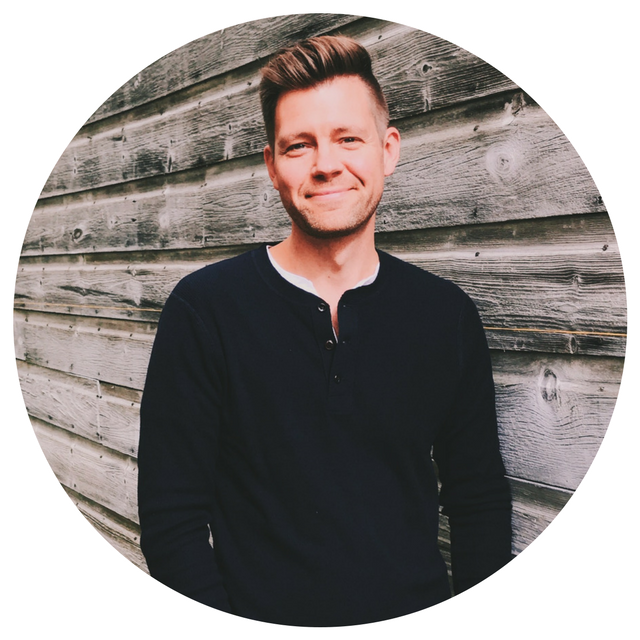
Chris Marlink
Chris is a husband, a father, and a sometimes soul shouter. He manages digital strategy for Kirk on Campus and plays at being a gentleman farmer. Follow his exploits at @cmarlink.
HAVE A QUESTION?
Get in Touch with Kirk on Campus
Connect via
Follow us on social media


